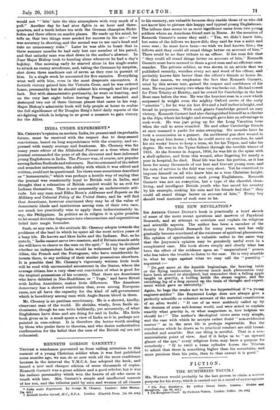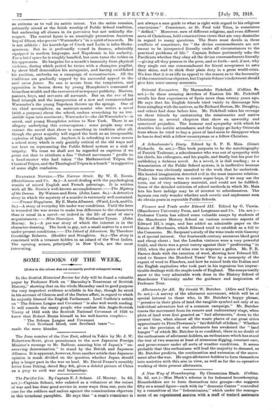FICTION.
THE HUMPHRIES TOUCH.t Ma. WATSON would probably be the last person to claim a serious purpose for his story, which is carried out in a mood of extravaganza
• The New Revelation. By Arthur Ronan Doyle. London : Hodder dad
Stoughton. 13a. ad. set)
t The Humphries Touch. By Frederick Watson. London: Coffins. Wont.] so extreme as to veil its satiric intent. Yet the satire remains, primarily aimed at the fetish worship of Public School tradition, but embracing all classes in its pervasive but not unkindly dis- respect. The central figure is an amazingly precocious American boy of fifteen who goes to "Warrender's " in a spirit of research. He is not athletic : his knowledge of Creek and Latin is infra-Shake- spearean. But he is profoundly versed in finance, admirably equipped in modern languages, and Napoleonic in his audacity. For a brief space he is roughly handled, but soon turns the tables on his oppressors. He bargains for a month's immunity from physical violence, during which period he trains with a champion pugilist, by sheer bluff demoralizes his antagonist, and having established his position, embarks on a campaign of reconstruction. All the traditions are gradually sapped by his successful appeal to the auri sacra fames. No one is secure from the temptation, and opposition is beaten down by young Humphries's command of boundless wealth and the resources of newspaper publicity. Masters, parents, boys, and servants all succumb. But on the eve of his final triumph and the inauguration of a new and commercialized Warrender's the young Napoleon throws up the sponge. One of his chief accomplices, an assistant-master who writes a novel (with a purpose) about the school, undoes everything by an irre- sistible lapse into sentiment ; Warrender's—the old Warrender's—is saved, and young Humphries retires to New York. There is an allegory underlying this extravaganza : some people may even extract the moral that Ahem is something in tradition after all, though the great majority will regard the book as an irresponsible explosion of high spirits. Anyhow, it is refreshing to come across a school story which is only genially critical of the old ways and not bent on representing the Public School system as a sink of iniquity. We trust we shall not be regarded as captious if we point out that to attribute a fine " Oxford movement " profile to a head-master who had taken "the Mathematical Tripoli, the Classical Tripes, and the Theological Tripes in a bunch " is suggestive of some slight confusion.



























 Previous page
Previous page